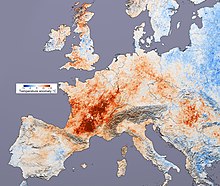 The difference in average temperature (2000, 2001, 2002 and 2004) from 2003, covering the date range of 20 July – 20 August[1] | |
| Type | Heat wave |
|---|---|
| Areas | Europe |
| Start date | July 2003 |
| End date | August 2003 |
| Peak temp. | 47.3 °C (117.1 °F), recorded at Amareleja, Portugal on 1 August 2003 |
| Losses | |
| Deaths | 72,000
|
The 2003 European heat wave saw the hottest summer recorded in Europe since at least 1540.[2][3] France was hit especially hard. The heat wave led to health crises in several countries and combined with drought to create a crop shortfall in parts of Southern Europe. The death toll has been estimated at more than 70,000.[4][5]
The predominant heat was recorded in July and August, partly a result of the western European seasonal lag from the maritime influence of the Atlantic warm waters in combination with hot continental air and strong southerly winds.[citation needed]
- ^ Emily Black; Mike Blackburn; Giles Harrison; Brian Hoskins; John Methven. "Factors Contributing to the Summer 2003 European Heatwave" (PDF). Department of Meteorology, University of Reading, UK. Archived from the original (PDF) on 13 October 2005. Retrieved 11 January 2022.
- ^ "WMO: Unprecedented sequence of extreme weather events – News – Professional Resources – PreventionWeb.net". Archived from the original on 18 October 2015. Retrieved 11 June 2011.
- ^ "Europe just had its warmest summer on record, EU scientists say". Reuters. 7 September 2021. Retrieved 4 October 2021.
- ^ Robi, Jean-Marie; Cheung, Siu Lan K.; Le Roy, Sophie; Van Oyen, Herman; Griffiths, Clare; Michel, Jean-Pierre; Herrmann, François Richard (2008). "Solongo". Comptes Rendus Biologies. 331 (2): 171–178. doi:10.1016/j.crvi.2007.12.001. ISSN 1631-0691. PMID 18241810.
- ^ UN Office for Disaster Risk Reduction (2020). "The human cost of disasters: an overview of the last 20 years (2000-2019)" (PDF).